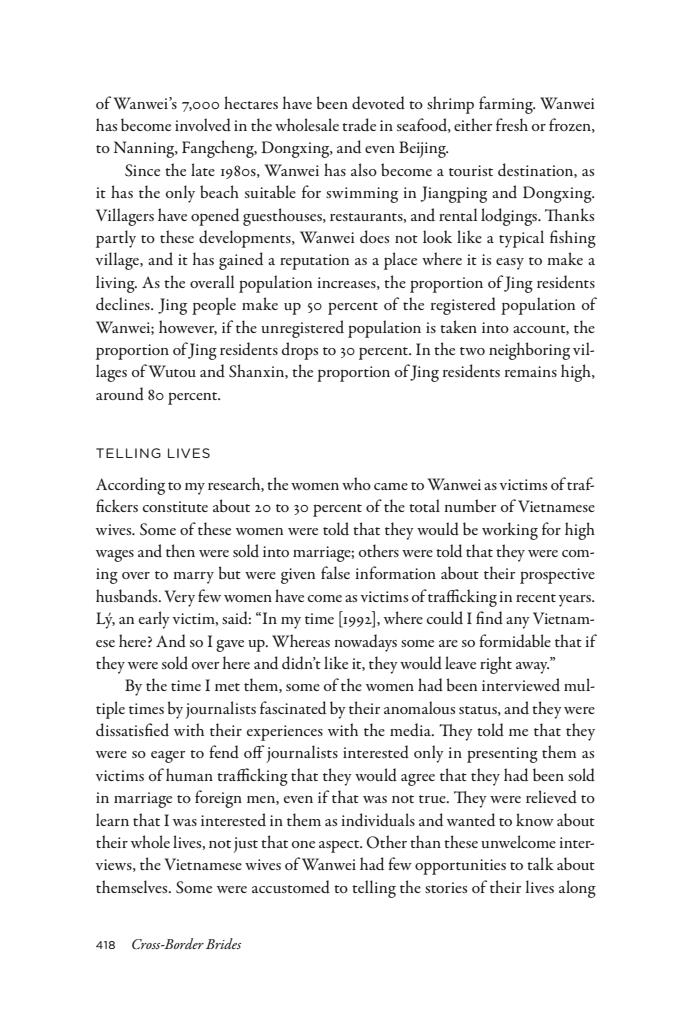正在加载图片...

of Wanwei's 7,ooo hectares have been devoted to shrimp farming.Wanwei has become involved in the wholesale trade in seafood,either fresh or frozen, to Nanning,Fangcheng,Dongxing,and even Beijing. Since the late 198os,Wanwei has also become a tourist destination,as it has the only beach suitable for swimming in Jiangping and Dongxing. Villagers have opened guesthouses,restaurants,and rental lodgings.Thanks partly to these developments,Wanwei does not look like a typical fishing village,and it has gained a reputation as a place where it is easy to make a living.As the overall population increases,the proportion of Jing residents declines.Jing people make up so percent of the registered population of Wanwei;however,if the unregistered population is taken into account,the proportion of Jing residents drops to 3o percent.In the two neighboring vil- lages of Wutou and Shanxin,the proportion of Jing residents remains high, around 8o percent. TELLING LIVES According to my research,the women who came to Wanwei as victims of traf- fickers constitute about 2o to 3o percent of the total number of Vietnamese wives.Some of these women were told that they would be working for high wages and then were sold into marriage;others were told that they were com- ing over to marry but were given false information about their prospective husbands.Very few women have come as victims of trafficking in recent years. Ly,an early victim,said:"In my time [1992],where could I find any Vietnam- ese here?And so I gave up.Whereas nowadays some are so formidable that if they were sold over here and didn't like it,they would leave right away." By the time I met them,some of the women had been interviewed mul- tiple times by journalists fascinated by their anomalous status,and they were dissatisfied with their experiences with the media.They told me that they were so eager to fend off journalists interested only in presenting them as victims of human trafficking that they would agree that they had been sold in marriage to foreign men,even if that was not true.They were relieved to learn that I was interested in them as individuals and wanted to know about their whole lives,not just that one aspect.Other than these unwelcome inter- views,the Vietnamese wives of Wanwei had few opportunities to talk about themselves.Some were accustomed to telling the stories of their lives along 418 Cross-Border Bridesùõý Cross-Border Brides of Wanwei’s 7,000 hectares have been devoted to shrimp farming. Wanwei has become involved in the wholesale trade in seafood, either fresh or frozen, to Nanning, Fangcheng, Dongxing, and even Beijing. Since the late 1980s, Wanwei has also become a tourist destination, as it has the only beach suitable for swimming in Jiangping and Dongxing. Villagers have opened guesthouses, restaurants, and rental lodgings. Thanks partly to these developments, Wanwei does not look like a typical fishing village, and it has gained a reputation as a place where it is easy to make a living. As the overall population increases, the proportion of Jing residents declines. Jing people make up 50 percent of the registered population of Wanwei; however, if the unregistered population is taken into account, the proportion of Jing residents drops to 30 percent. In the two neighboring villages of Wutou and Shanxin, the proportion of Jing residents remains high, around 80 percent. TELLING LIVES According to my research, the women who came to Wanwei as victims of traffickers constitute about 20 to 30 percent of the total number of Vietnamese wives. Some of these women were told that they would be working for high wages and then were sold into marriage; others were told that they were coming over to marry but were given false information about their prospective husbands. Very few women have come as victims of trafficking in recent years. Lý, an early victim, said: “In my time [1992], where could I find any Vietnamese here? And so I gave up. Whereas nowadays some are so formidable that if they were sold over here and didn’t like it, they would leave right away.” By the time I met them, some of the women had been interviewed multiple times by journalists fascinated by their anomalous status, and they were dissatisfied with their experiences with the media. They told me that they were so eager to fend off journalists interested only in presenting them as victims of human trafficking that they would agree that they had been sold in marriage to foreign men, even if that was not true. They were relieved to learn that I was interested in them as individuals and wanted to know about their whole lives, not just that one aspect. Other than these unwelcome interviews, the Vietnamese wives of Wanwei had few opportunities to talk about themselves. Some were accustomed to telling the stories of their lives along